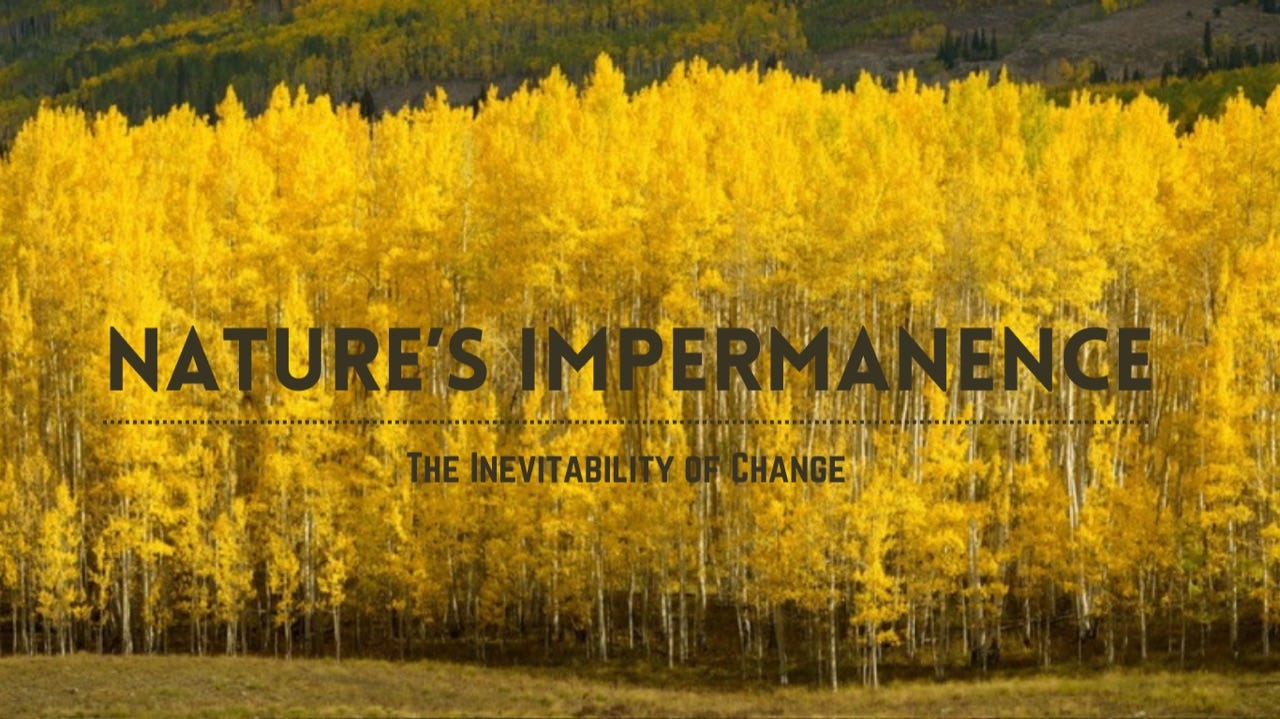Leaves rustling in the wind, birds chirping in the trees, rain falling, tap, tapping on the ground—all the music of nature, which is fleeting, like a dream that fades away with the morning light.
Nothing in life is permanent. The leaves that dance in the wind will one day wither and fall, the birds that sing in the trees will migrate to warmer lands, and the rain that nurtures the earth will evaporate into the sky.
We humans, find this impermanence both a source of wonder and a source of sadness. We marvel at the beauty of nature, the vibrant colors of the flowers, the majesty of the mountains, and the vastness of the oceans.
We also mourn the loss of what we hold dear, the destruction of forests, the extinction of species, and the changing of seasons.
Yet, even as we mourn losing what was, we must remind ourselves that nature constantly renews itself. New life springs from the ashes of the old, and the cycle of birth and death continues.
Change is inevitable. But it is also a source of hope that new life and new beauty will emerge.
As we contemplate the impermanence of nature, we also consider our mortality. Like the leaves, birds, and rain, we, too, are part of this cycle of life and death.
Nature reminds us every day that we are all connected, and that we are all part of this beautiful and fragile world. Let us treasure the moments we have and let us work together to protect and preserve the beauty and wonder of nature.
Author’s Note
I wrote this after I reread the poem, Spring and Fall. It is a beautiful poem that captures the essence of change and the inevitable loss of innocence that takes place. Written by Gerard Manley Hopkins in 1880, the poem is a masterpiece that showcases the beauty of nature and how human emotions often intertwine with it. It is a reflection of the transition from childhood to adulthood and how it affects us all.
Hopkins explores the idea of innocence and how it is lost as we grow older. The poem's penultimate line, "It is the blight man was born for," is a powerful statement on the human condition and the inevitability of mortality. Hopkins writes in the final line, "It is Margaret you mourn for.” Margaret is no longer the innocent child she once was. She has grown up, and with that, she has lost her sense of wonder and innocence.
The use of language in the poem is exquisite. Hopkins uses alliteration, rhyme, and repetition to create a musical quality. The words flow smoothly, and the rhythm is perfect. The poem is a joy to read, and it is easy to get lost in the beauty of the language.
Here then, is the poem Spring and Fall by Gerard Manley Hopkins.
Márgarét, áre you gríeving Over Goldengrove unleaving? Leáves, like the things of man, you With your fresh thoughts care for, can you? Ah! ás the heart grows older It will come to such sights colder By and by, nor spare a sigh Though worlds of wanwood leafmeal lie; And yet you will weep and know why. Now no matter, child, the name: Sórrow's spríngs áre the same. Nor mouth had, no nor mind, expressed What heart heard of, ghost guessed: It ís the blight man was born for, It is Margaret you mourn for.
Thanks very much for reading, subscribing, and sharing the stories, poetry, and essays in this space. If you like a story, poem, or essay please click on the heart. Also if you are so moved, please leave a comment. You also can show your appreciation by buying me breakfast.






Wow, this is really beautiful. As a wannabe Buddhist, the concept of impermanence is very familiar to me.